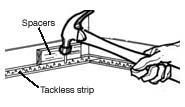|
installing
carpet

Installing Carpet
Stretch-in
Carpet Installation
There are situations in which the specifier will wish to utilize the
stretch-in method. Its selection may be for one of the following reasons:
- Provides enhanced underfoot comfort,
acoustical properties (i.e., higher noise reduction coefficients and
higher impact noise ratings) when installed with separate cushion
- Increases thermal insulation (R-value)
- Can be used over floors that are
unsuitable for glue-down
- Patterned carpet may be more easily
matched
- Corrective measures, such as seam
repair, may be easier to perform
- Removal costs usually are less than
the removal of an adhered installation
Stretch-in Carpet Installations should be
avoided:
- On ramps and inclines
- Where office systems furniture and
demountable partitions are utilized
- Where heavy rolling traffic is likely
- Where there is excessive humidity
- When carpet has a unitary backing or
other backing systems designed only for glue-down installation
Direct Glue-down Installation
- Suitable for rolling traffic and ramp
areas
- Seams are more durable since there is
no vertical flexing
- Minimized buckling in buildings that
have HVAC systems turned off for extended periods of time
- No restretch situations
- Facilitates access to electrical and
telephone lines under floor
- Practically eliminates incidences of
seam peaking
- No restrictions to area size
- Intricate border and inlay
possibilities
- Usually less expensive
Double Glue-down Installation
- Combines the stability of direct
glue-down carpet with the cushioning benefits of a separate cushion,
stretch-in installation
- Improves carpet appearance retention,
foot comfort and overall performance
- Simplifies carpet bordering and
inlaying
- Suitable for wheeled traffic areas
- No restrictions to size of area
© 2008 FloorBiz, Inc. All Rights Reserved
Flooring |
Flooring Guide |
Flooring Info |
Flooring Forum
| |









